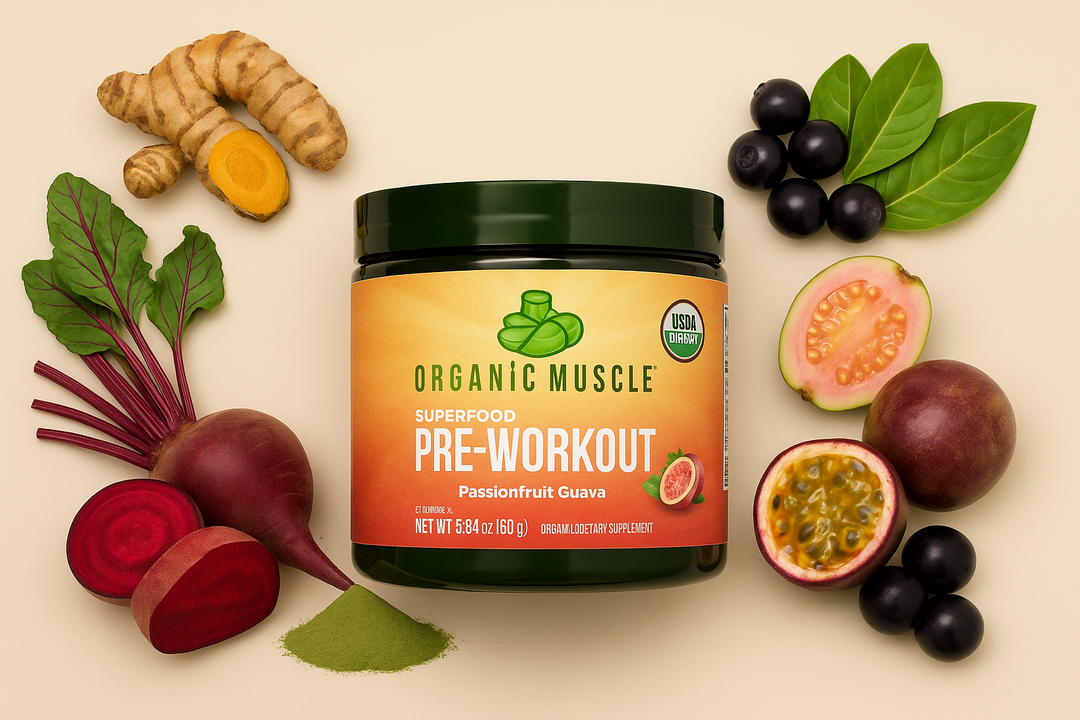Key Takeaways:
- Ingredients Matter: Caffeine and digestive stimulants in pre-workout supplements can cause increased bowel movements.
- Unique Reactions: Individuals' reactions to pre-workout ingredients like artificial sweeteners and amino acids vary, making personal experience crucial.
- Additional Factors: Timing and dosage adjustment of pre-workout intake can mitigate potential digestive discomfort for a smoother workout experience.
At Organic Muscle, we're not just committed to fitness; we're pioneers in revolutionizing your workout experience with all-natural, organic supplements. Our reputation is built on delivering superior, eco-friendly products that not only meet but exceed the expectations of wellness enthusiasts everywhere. Organic Muscle is trusted by committed health and wellness enthusiasts who want trustworthy products that deliver results.
Pre-workout supplements are a staple for many fitness enthusiasts, known for boosting energy, enhancing focus, and improving performance during workouts. However, there's one question that often comes up: Does pre-workout make you poop?
It's a topic that might seem a little awkward, but it's important to address, especially if you're considering incorporating pre-workout into your routine. Understanding how pre-workout affects your digestive system can help you optimize your training sessions and avoid unexpected bathroom trips.
In this piece, we will discuss the relationship between pre-workout supplements and bowel movements, offering insights and tips to help you have a comfortable and effective workout experience.
What Is Pre-Workout And Why Do People Use It?
Pre-workout is a blanket term for a dietary supplement designed to boost energy and enhance athletic performance. These supplements typically come in powder form, meant to be mixed with water or juice and consumed before a workout.
Think of pre-workout as your secret weapon to unlock peak performance. It often contains a blend of ingredients, each playing a crucial role: some ingredients boost energy, others enhance focus, and some even improve blood flow for better muscle pumps.
But why exactly do people use pre-workout? Let's delve into the reasons:
-
Energy Boost: Let's face it, dragging yourself to the gym after a long day can be tough. Pre-workout provides a much-needed energy boost, thanks to ingredients like caffeine and beta-alanine. This can help you power through even the toughest workouts.
-
Increased Endurance: Pushing through that last rep or mile can make all the difference. Certain ingredients found in pre-workout, such as creatine and beta-alanine, may help delay muscle fatigue and improve endurance, allowing you to train harder and longer.
-
Improved Muscle Pumps: That feeling of your muscles being full and tight during a workout? That's a muscle pump, and it's not just about aesthetics. Pre-workout often contains ingredients like citrulline malate and arginine, which can increase blood flow to muscles, enhancing pumps and potentially aiding in nutrient delivery.
- Motivation Booster: Sometimes, all you need is a little push to get going. The ritual of preparing and consuming your pre-workout can be a powerful psychological motivator, signaling to your body and mind that it's time to train.
Does Pre-Workout Make You Poop? Understanding The Connection
Okay, let's talk about why that pre-workout might have you running to the bathroom before you even hit the gym. The truth is, several ingredients commonly found in pre-workouts can have a laxative effect, leading to some, shall we say, inconvenient trips to the toilet.
-
Caffeine, a central ingredient in many pre-workouts, is well-known for its energy-boosting properties. But here's a fun fact: it's also a natural laxative. Caffeine stimulates muscle contractions in the colon, which are those internal nudges pushing waste out of your body. So, if your pre-workout has a high caffeine content, it might expedite your next bathroom trip.
-
Artificial sweeteners and sugar alcohols, while being fantastic for keeping the calorie content low, can sometimes play hide and seek with your digestive tract. For some people, their gut may have a harder time breaking these down, leading to an express ticket to the restroom.
- Amino acids like arginine and citrulline are staples in pre-workout formulations, praised for enhancing blood flow and improving workout performance. Interestingly, for some individuals, these amino acids can increase bowel movements due to their impact on the body's nitric oxide levels, affecting how your intestines contract.
So, the question isn't really if pre-workout supplements make you poop, but rather how your body responds to the ingredients mixed into that powerful pre-gym shake. It's about understanding that everyone's digestive system dances to a different beat.
Caffeine In Pre-Workout: A Key Culprit Behind Sudden Bathroom Trips
We've all been there: that moment after your pre-workout kicks in when you're feeling energized and ready to conquer the gym…followed by a sudden, urgent need to find a bathroom. While many factors contribute to this phenomenon, caffeine, the beloved stimulant in many pre-workout formulas, often plays a starring role.
Caffeine, beyond its energizing effects, can stir up quite a storm in your digestive system. Let's break it down:
-
Muscle Action, Accelerated: Caffeine is a stimulant, meaning it excites activity in your body. This includes your muscles, and yes, even those in your digestive tract. When caffeine enters the scene, these muscles contract more frequently, essentially speeding up the digestive process.
-
Gastric Juice on Overdrive: Caffeine also increases the production of gastric acid in your stomach. This acid is essential for breaking down food, but an overabundance can lead to discomfort and, you guessed it, an urgent need to use the restroom.
- The Gut-Brain Connection: Caffeine can also directly stimulate the nerves in your gut, sending signals to your brain that translate to those "gotta-go" sensations, even if you haven't eaten much beforehand.
So, while that pre-workout caffeine boost might be just what you need to power through a workout, be prepared for a potential pit stop along the way.
Other Ingredients That May Cause Digestive Discomfort
While the conversation about whether pre-workout supplements lead to more trips to the bathroom is amusing and practical, it’s essential to consider what other ingredients in these products might stir up digestive discomfort.
Artificial Sweeteners and Sugar Alcohols
Though not ours, many pre-work-out formulas on the market contain artificial sweeteners or sugar alcohols to enhance taste without adding calories. Ingredients like sucralose (which we proudly avoid) can cause gastrointestinal distress for some folks. These substances can pull water into the intestine or get fermented by gut bacteria, leading to gas, bloating, and, yes, potentially more bathroom breaks.
Creatine
Creatine is another common pre-workout ingredient praised for its ability to enhance performance and muscle growth. However, it can also result in digestive issues for some, particularly if taken in large doses without adequate hydration. Ensuring proper water intake is key when consuming products with creatine to mitigate unwanted bathroom urgency.
Fiber
Some health-focused pre-workout blends might include added fiber to support digestion and overall health. Although fiber benefits the digestive system, an abrupt increase in intake can lead to discomfort, bloating, and changes in bowel movements. It's always best to increase fiber gradually and ensure you’re staying hydrated.
How Timing Your Pre-Workout Can Impact Digestive Health
Think of your body as a finely tuned machine, especially when you're gearing up for exercise. Introducing a pre-workout – packed with ingredients designed to energize and enhance performance – too close to your workout can throw a wrench into your system. Your body, already busy preparing for physical exertion by increasing blood flow to your muscles, might end up diverting resources away from digestion. This can lead to a range of uncomfortable symptoms, from bloating and gas to more urgent digestive distress.
The solution? Give your body the time it needs to process your pre-workout effectively. Instead of guzzling it down right before you hit the gym, consider taking it about 30 to 60 minutes before your workout. This allows ample time for your body to absorb the ingredients, kickstart its energy production, and prepare for the workout ahead – all without compromising your digestive comfort.
By being mindful of your pre-workout timing, you're essentially optimizing your body's internal environment. You're ensuring that your system is primed for both peak physical performance and digestive harmony, setting yourself up for a more successful and enjoyable workout experience.
Are You Sensitive To Caffeine? Choosing The Right Pre-Workout For You
Understanding your body's reaction to caffeine is crucial when selecting a pre-workout supplement. If you feel jittery, anxious, or overly stimulated with just a small amount of caffeine, opting for a low-caffeine or caffeine-free pre-workout might be your best bet. Notably, the absence of caffeine doesn't equate to a lack of energy boost. Many alternatives exist formulated to enhance your workout without the unwanted bathroom trips.
At Organic Muscle, we understand the unique needs of every fitness enthusiast. Our range of pre-workout supplements is designed with everyone in mind, providing options that are effective and cater to various dietary and physical sensitivities. Whether you're seeking a gentle nudge or a robust boost sans the caffeine, our products are crafted to ensure you get the most out of your workout without compromising your comfort and health.
In choosing the right pre-workout for your sensitivity level, consider the following tips:
-
Start with a small dose: If new to pre-workout supplements or trying a new product, begin with a lower dosage than recommended and gradually increase as needed. This will help your body adjust without overwhelming it.
-
Read the label: Look for products that clearly outline their caffeine content. At Organic Muscle, our labels are designed to be user-friendly, highlighting key ingredients and their benefits, ensuring you make an informed choice.
- Opt for certified organic ingredients: Avoiding synthetic stimulants and choosing supplements with certified organic, non-GMO ingredients can reduce the risk of adverse reactions. Every item in our line promises a commitment to holistic health, free from harsh chemicals or unnecessary fillers.
Remember, the goal of a pre-workout supplement is to enhance your fitness regimen, not hinder it. By paying attention to your body's response to caffeine and choosing a pre-workout that aligns with your needs, you can balance stimulation and comfort, ensuring a productive and enjoyable workout experience.
Strategies To Avoid Bathroom Breaks During Your Workout
For many fitness enthusiasts, the sight of the gym is often met with great zeal, a time to break a sweat and push the boundaries of personal fitness. However, an untimely bathroom break can easily disrupt the flow of a well-planned workout session. To help you stay focused on your workout rather than the location of the nearest restroom, here are some practical strategies.
Monitor Your Pre-Workout Intake
Understanding the ingredients in your pre-workout supplement can make a difference. At Organic Muscle, our products are designed with your holistic wellness in mind. By choosing supplements free from harsh chemicals, hormones, sucralose, and preservatives, you're less likely to experience digestive disruptions. Still, it's wise to test how your body responds to any supplement by starting with smaller doses.
Hydrate Wisely
Staying hydrated is crucial, especially during intense physical activity. However, timing is everything. Drinking too much liquid immediately before or during your workout can lead to uncomfortable interruptions. Try to hydrate consistently throughout the day and moderate your intake in the hour leading up to your gym session.
Mind Your Diet
Pre-workout nutrition isn't just about supplements but the whole meal. Foods rich in fiber, while generally healthy, can accelerate digestion and lead to the need for a bathroom break mid-workout. Consider lighter, easily digestible meals 2-3 hours before exercising for optimal comfort and performance.
Listen to Your Body
Our bodies often signal when we're ready to exercise. If you need to go to the bathroom, it's better to take care of that before starting your workout. Trying to "hold it" can detract from your focus and performance and lead to discomfort or health issues.
Opt for a Light Warm-up
Engaging in a light warm-up can help settle your stomach and prepare your body for the session ahead. Gentle stretches, a brisk walk, or a slow jog could be all you need to ensure you're feeling your best as you dive into more intensive exercises.
Should You Be Concerned? When To Seek Advice About Pre-Workout And Digestion
We all know that feeling - the pre-workout kicks in and you're ready to crush your workout. But what happens when that feeling is accompanied by an unexpected rumble in your stomach? While experiencing some digestive discomfort after taking pre-workout is fairly common, knowing when to shrug it off and when to seek advice can be confusing.
Here's the deal: most pre-workouts contain ingredients that can temporarily impact digestion. Think about it – ingredients designed to boost energy and enhance performance can sometimes stir things up a bit in the gut. Usually, these effects are mild and subside quickly. We're talking about a little bloating, some gas, maybe a slight upset stomach. These are usually nothing to sweat over (unless you're mid-burpee, of course).
However, your gut is your friend, and it's crucial to listen to what it's telling you. If you experience any of the following, hitting pause on the pre-workout and reaching out to your doctor or a registered dietician is a good idea:
-
Severe or persistent digestive issues: We're not talking about a fleeting feeling of fullness here. We're talking about issues that are intense, happen every time you take pre-workout, or simply won't quit. Think persistent diarrhea, intense stomach cramping, or vomiting.
-
Dehydration: Diarrhea can lead to dehydration, so if you're experiencing excessive thirst, fatigue, or dizziness, seek medical attention.
-
Blood in Your Stool: This is a serious symptom and should be evaluated by a doctor immediately.
-
Signs of an allergic reaction: This is a big one. Hives, itching, swelling, difficulty breathing – these are not your typical side effects and warrant immediate medical attention.
- Worsening of pre-existing conditions: If you have a history of digestive issues like IBS or Crohn’s disease, it's best to chat with your doctor before adding anything new, like pre-workout, to your routine.
Remember, pre-workout is meant to enhance your workout, not sabotage it with digestive distress. Listen to your gut, and when in doubt, always seek personalized advice from a healthcare professional.
Final Thoughts
Pre-workout supplements can significantly boost your energy, endurance, and motivation, helping you push through challenging workouts. However, it's essential to understand how your body responds to these supplements to avoid digestive discomfort. You can optimize your performance by selecting the right pre-workout, paying attention to ingredients, and timing your intake while minimizing potential side effects.
At Organic Muscle, our commitment to your health shines through in every non-GMO, vegan, gluten-free, keto-friendly, dairy-free, and chemical-free note of our product offerings. We believe in the power of nature to fuel your fitness journey without unnecessary additives that could disrupt your digestive harmony or overall wellness. So, while our pre-workout supplements are designed to energize and prepare your body for exercise, they align with our value proposition of embodying safety and efficacy.
For health and fitness enthusiasts, understanding your body's reactions to supplements can be crucial in optimizing your nutrition, workout performance, and overall health. Remember, it's about creating a wellness routine that resonates with your body's needs and health goals. And with Organic Muscle, you're not just choosing a supplement; you're choosing a partner in your holistic wellness journey.
Read also:
- Is Pre-Workout Natty? Understanding Natural Vs. Synthetic Ingredients
- Stomach Discomfort And Pre-Workout: Understanding The Causes And Solutions
- Can Pre-Workout Supplements Stunt Growth? Separating Myth From Fact
Frequently Asked Questions About Pre-Workout Making You Poop
Is it safe to take pre-workout if you have a sensitive stomach?
While pre-workout can be a great boost for many, those with sensitive stomachs might experience some discomfort. If you're prone to digestive issues, choosing a gentle pre-workout formula is crucial. Look for products with natural ingredients and avoid artificial sweeteners, which can be tough on digestion and lead to unwanted bathroom breaks.
Should you eat before taking pre-workout to prevent pooping?
Having a little something in your stomach can definitely help prevent mid-workout surprises. Consider a light snack or meal containing carbohydrates and protein about 1-2 hours before hitting the gym. This provides your body with sustained energy and can help pre-workout go down (and stay down) more smoothly.
What should you do if pre-workout consistently causes bowel movements?
If your pre-workout consistently throws your gut for a loop, listen to your body! It might be time to switch brands or ditch the pre-workout altogether. Opt for a product with natural ingredients and no artificial additives. You can also experiment with the dosage, starting with a smaller amount and gradually increasing it to assess your tolerance.
How long do pre-workout supplements stay in your system?
Most pre-workout supplements are designed to be metabolized within 4-6 hours after ingestion. However, factors like metabolism, body weight, and dietary habits can affect how long the effects last.
What are the risks of ignoring persistent digestive issues from pre-workout?
Ignoring ongoing digestive discomfort can lead to more serious health issues. Frequent bowel movements, especially if accompanied by pain or discomfort, can lead to dehydration and nutrient deficiencies. If you experience persistent issues, it’s important to consult with a healthcare professional to rule out underlying conditions.
Can pre-workout cause dehydration and affect stools?
Yes, certain ingredients in pre-workout supplements, like caffeine, can have a diuretic effect, leading to dehydration if not countered with adequate water intake. Dehydration, in turn, can affect stool consistency and frequency.
Disclaimer: Organic Muscle products are not intended to treat, diagnose, mitigate, prevent, or cure disease. Organic Muscle products should not replace prescribed medications or the variety of foods important to a healthful diet.














